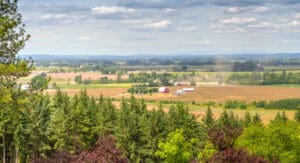In Oregon, it’s common to have unincorporated areas- inside city limits or outside a city’s borders. Unincorporated communities are parcels of land that exist outside the jurisdiction of any city or town–meaning they are not regulated by the surrounding or nearby city’s governments. Unincorporated communities do not have local governments and rely on other communal or county resources for everything from police to library services. Often nestled within rural landscapes, these areas tend to host relatively small populations. In Oregon, the governance of an unincorporated community falls under the purview of county plans and land use regulations.
 Navigating Land Use Regulations and Unincorporated Communities
Navigating Land Use Regulations and Unincorporated Communities
Land use laws exert varying influences on incorporated and unincorporated communities. In Oregon, county plans and land use regulations may authorize residential use and density within unincorporated communities, contingent upon the stipulations outlined in the division. It can be challenging to figure out how land use laws impact property within an unincorporated community, so obtaining help from a professional land use consultant like Richard Stevens and Associates ensures you receive the most accurate answers to your questions.
The Pros and Cons of Living in an Unincorporated Community in Oregon
Living in an unincorporated community in Oregon has its benefits and drawbacks. Here are some of the benefits people enjoy while living in these areas:
- Fewer regulations: One of the most significant benefits of living in an unincorporated community is that there are usually fewer regulations that apply to your property. This means you may be able to do more with your property without as much oversight while paying less in taxes.
- More privacy: Unincorporated communities can offer more privacy than living in a city or town. Since many of these areas have smaller populations and less density, you may be able to enjoy more peace and quiet.
- More real estate flexibility: Living in an unincorporated community can offer more flexibility regarding real estate. You may be able to build a larger home or have more land to work with than you would in a city or town.
- Self-sustainability: Oregon offers a unique opportunity to live completely self-sustained, and with its mild climate and varied landscape, it’s easy to find ways to take advantage. Living in an unincorporated community can allow you to live off the grid and be more self-sufficient.
- Lower cost of living: Living in an unincorporated community can be less expensive than living in a city or town. Property taxes and other expenses may be lower, which can help you save money.
However, there are also some drawbacks to living in an unincorporated community in Oregon. Here are some of the cons:
- Fewer services: Unincorporated areas often don’t have emergency services like police, fire, or ambulance support present for the community, and when they do exist, they may be costly or take longer to get to you. Residents may need to rely on county services rather than city resources, which can be further away or have less availability. This can be a significant drawback if you need emergency services.
- Lack of governance: Unincorporated communities typically do not have elected officials at the town level. Since unincorporated communities are not officially considered municipal areas of their own accord, they often act as a part of a larger municipality, such as a county or city. This can lead to a lack of governance and representation for the community.
- Limited resources: Unincorporated communities may have limited resources for things like schools, libraries, and other public services. This can make it more difficult to access the help you need.
- Uncertainty about the future: Since unincorporated communities are not officially considered municipal areas of their own accord, there may be uncertainty about the community’s future. This can make it challenging to plan for the long term.
We can answer all your questions about unincorporated property.
If you’re buying real estate that is deemed unincorporated, it’s important to understand what that will mean for you. For example, it may impact the schools your kids attend, whether or not you have access to a city sewer system, who will respond to a house fire, or if you’ll be eligible for a city library card. Since every unincorporated area is different, it’s best to rely on the professional services of Richard Stevens and Associates to obtain accurate answers to your questions before you invest.

 Navigating Land Use Regulations and Unincorporated Communities
Navigating Land Use Regulations and Unincorporated Communities